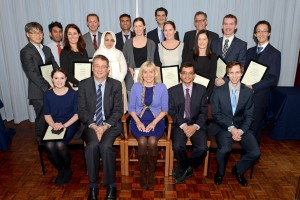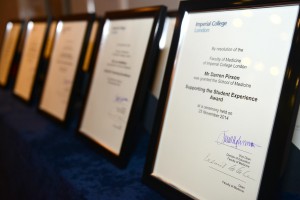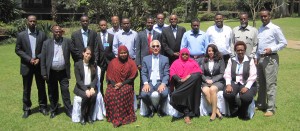 The School of Medicine Awards for NHS Teachers evening took place on Tuesday 25 November. The annual ceremony recognises the enormous contribution of NHS staff to the education of undergraduates and postgraduates in the Faculty of Medicine. Fifteen members of staff received awards, which were presented by Professor Dermot Kelleher, Vice President (Health) and Dean of the Faculty Medicine. Many of the students who nominated the winners attended to describe their teachers’ impact on their education at Imperial. The ICSM Students’ Union Light Opera Society also performed for guests.
The School of Medicine Awards for NHS Teachers evening took place on Tuesday 25 November. The annual ceremony recognises the enormous contribution of NHS staff to the education of undergraduates and postgraduates in the Faculty of Medicine. Fifteen members of staff received awards, which were presented by Professor Dermot Kelleher, Vice President (Health) and Dean of the Faculty Medicine. Many of the students who nominated the winners attended to describe their teachers’ impact on their education at Imperial. The ICSM Students’ Union Light Opera Society also performed for guests.
 This year, two new awards were created: the Supporting the Student Experience award (for NHS staff in non-teaching roles), which was presented to Darren Pirson, Medical Education Manager at Ashford and St Peter’s NHS Foundation Trust. The Distinguished Teacher award, only open to previous teaching award winners, was introduced to recognise a sustained, outstanding contribution to education. The inaugural Award was given to Dr Naila Kamal of London North West Healthcare NHS Trust. Dr Kamal gave a presentation on her experiences of teaching our students.
This year, two new awards were created: the Supporting the Student Experience award (for NHS staff in non-teaching roles), which was presented to Darren Pirson, Medical Education Manager at Ashford and St Peter’s NHS Foundation Trust. The Distinguished Teacher award, only open to previous teaching award winners, was introduced to recognise a sustained, outstanding contribution to education. The inaugural Award was given to Dr Naila Kamal of London North West Healthcare NHS Trust. Dr Kamal gave a presentation on her experiences of teaching our students.
Closing the event, Professor Jenny Higham, Vice Dean (Education and Institutional Affairs) congratulated all the award winners, describing them as an inspiration to the next generation of doctors.
A full list of award winners can be found at: http://www1.imperial.ac.uk/medicine/prospectivestudents/undergraduate/contacts/awards/
Chris Harris
Quality and Educational Development Manager
Imperial College School of Medicine
